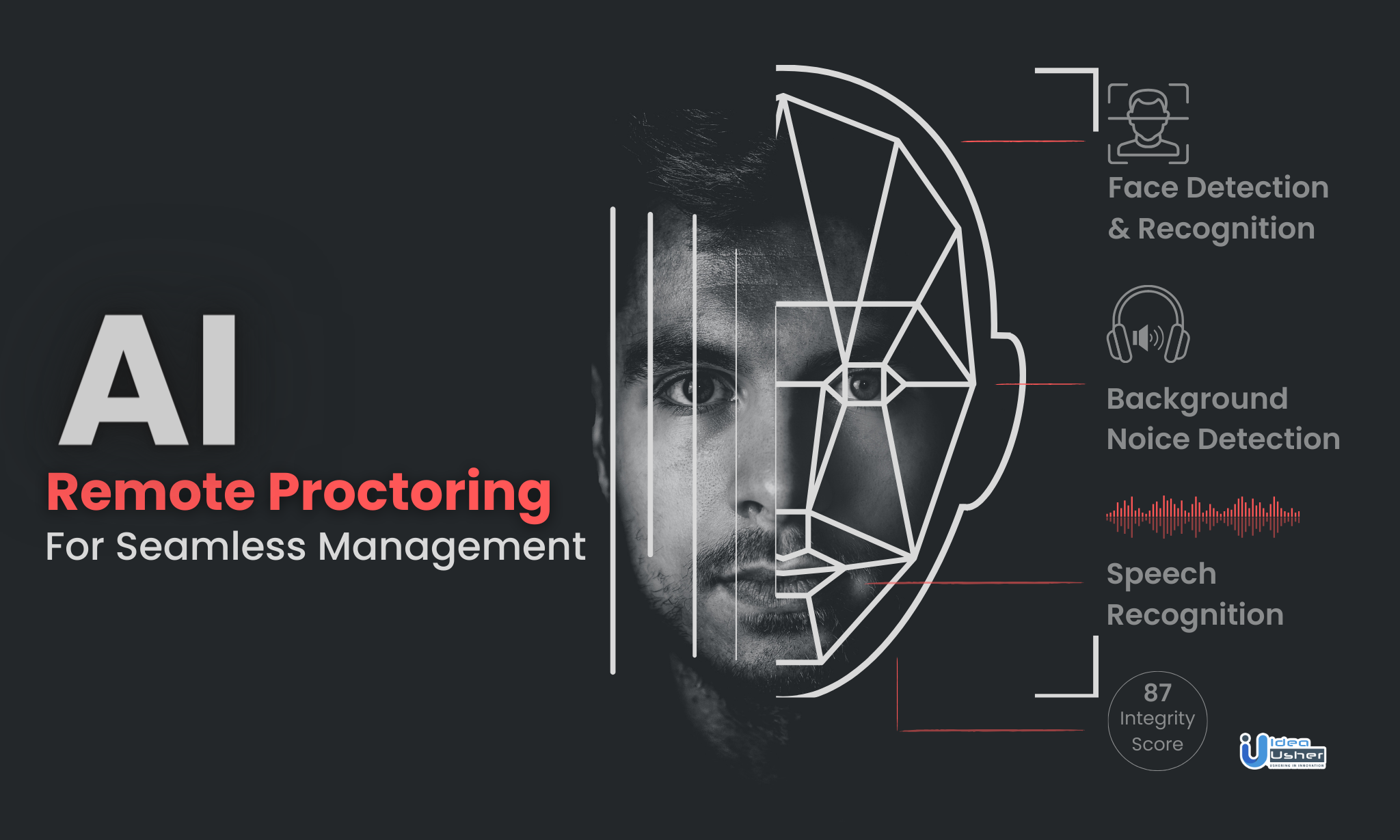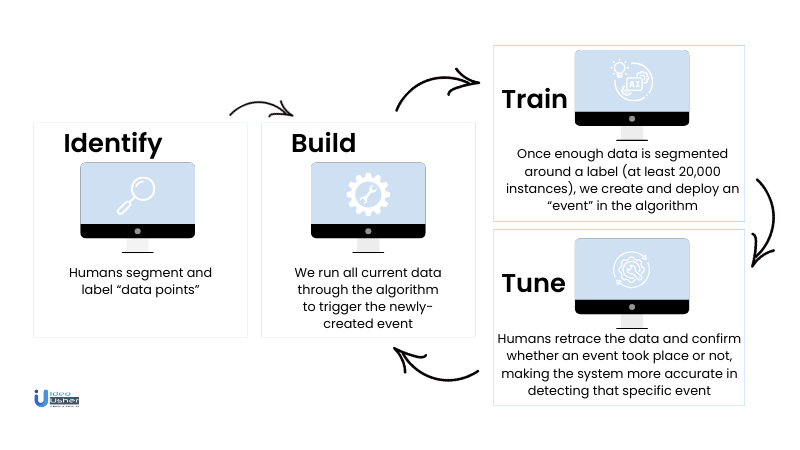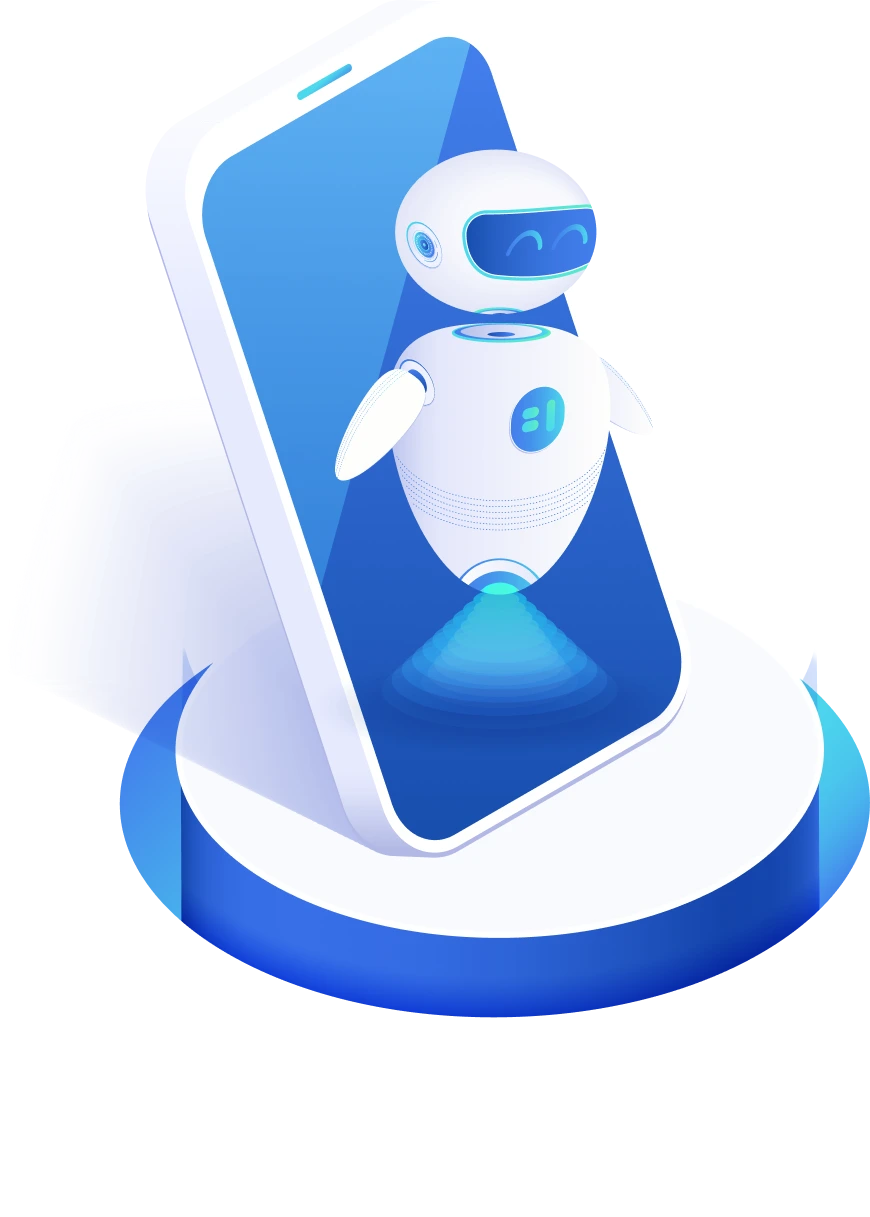- What Is Remote Proctoring?
- What Is AI-based Remote Proctoring?
- How AI-based Remote Proctoring Works?
- AI Technologies Employed In Remote Proctoring
- Limitations Of AI-Based Remote Proctoring
- Top 7 AI Remote Exam Proctoring Software In The Market
- Case Study: Leveraging Artificial Intelligence to Transform Education
- Conclusion
- FAQ

Institutions navigating the complexities of modern education increasingly turn to remote proctoring for semester-end and entrance exams. With the pandemic forcing school closures and the proliferation of internet-sourced assignments, some universities have embraced remote testing, even with organizations like ETS monitoring exams from afar. However, implementing this approach at scale presents formidable challenges.
Amidst this era of academic uncertainty and shifting paradigms, institutions are earnestly seeking comprehensive solutions that seamlessly balance security, user experience, convenience, and logistical feasibility for both educators and students. As exams are frequently postponed or canceled due to the pandemic’s persistent risks, remote proctoring emerges as a crucial lifeline, allowing students to take their assessments safely from home.
By integrating AI-driven remote proctoring with vigilant monitoring, institutions can effectively combat cheating during exams. This approach harmoniously combines manual oversight and AI surveillance, offering numerous benefits. It empowers students to undertake exams from anywhere with the necessary technology while simultaneously eliminating the necessity for physical examination centers. This heralds a new era of convenience and adaptability in the realm of academic evaluations.
- What Is Remote Proctoring?
- What Is AI-based Remote Proctoring?
- How AI-based Remote Proctoring Works?
- AI Technologies Employed In Remote Proctoring
- Limitations Of AI-Based Remote Proctoring
- Top 7 AI Remote Exam Proctoring Software In The Market
- Case Study: Leveraging Artificial Intelligence to Transform Education
- Conclusion
- FAQ
What Is Remote Proctoring?
Remote proctoring, often known as online invigilation, is a crucial method employed to maintain the integrity of exams conducted remotely, such as those taken from the comfort of one’s home, while simultaneously safeguarding against dishonest behavior. Traditionally, the responsibility of ensuring fair testing conditions fell upon proctors or invigilators who physically patrolled exam venues and test centers, closely monitoring students as they completed their exams. However, the advent of remote proctoring has ushered in a transformative shift, eliminating the need for on-site overseers. Instead, it employs a semi-automated approach to monitor candidates’ actions in real-time. There are diverse proctoring methods, including subsequent proctoring, live proctoring, and automated proctoring, that offer tailored solutions to uphold the authenticity of remote assessments.
Different Types Of Proctoring
Proctoring methods vary to suit diverse examination needs, each offering unique benefits:
1. Video Proctoring
Primarily employed in high-stakes exams, video proctoring involves continuous streaming of candidates’ activities. Throughout the exam, their behavior is meticulously recorded, enabling assessors to detect potential cheating or misconduct.
2. Image Proctoring
Particularly useful in regions with unreliable internet connectivity, image proctoring conducts random verifications of remote candidates. It captures candidate images at specified intervals, such as exam initiation, conclusion, or specific question attempts. These images can later be authenticated by educational institutions to ensure the integrity of online exams.
3. Auto Proctoring
Auto proctoring automates the monitoring and analysis of remote candidates during online assessments. It entails continuous streaming of candidates’ actions and employs video and image analysis to identify irregularities, such as mobile phone use, unauthorized assistance, or reference material.
4. Candidate Identity Verification
Before commencing online exams, candidate identity verification is a crucial step. Candidates are required to display their identity card and exam hall ticket in front of a camera. A remote proctor reviews the submitted documents, approving or rejecting candidates based on the provided records.
In contrast to these methods, automated proctoring, a cutting-edge approach, leverages webcam and screen-sharing technologies. It replaces human proctors with computer algorithms capable of flagging suspicious behaviors. Utilizing machine learning and artificial intelligence, these systems continually improve their ability to identify subtle anomalies like low audio levels, whispers, reflections, and shadows. The integration of AI into proctoring aims not to replace human oversight but to enhance its accuracy by assisting proctors in detecting nuanced irregularities.
What Is AI-based Remote Proctoring?
AI-based remote proctoring is a strong solution for preserving the integrity of remote or home-based exams and preventing cheating. It relies on Artificial Intelligence (AI) to identify suspicious behavior and detect any unauthorized objects within the examination setting. This technology offers real-time automation during exams, negating the need for human proctors, and can later review session recordings for additional examination.
Utilizing advanced algorithms, AI-driven remote proctoring verifies user identities and identifies instances of exam misconduct, generating comprehensive reports for educators to confirm exam integrity.
Furthermore, AI extends its impact by significantly increasing the number of candidates a single proctor can oversee, potentially by up to 300 percent. This underscores AI’s pivotal role in revolutionizing remote exam invigilation, making it a powerful tool for both educators and institutions alike.
Here are the ways in which AI can improve remote proctoring:
AI technologies offer several advantages in improving the effectiveness of remote proctoring, providing enhanced monitoring and security for online assessments:
1. Enhanced Accuracy
AI acts as an additional pair of eyes alongside human proctors. It can promptly detect and alert proctors to any suspicious behavior, catching details that humans may not have time to recognize in real-time.
2. Increased Scalability
Improved accuracy in identifying unusual behavior streamlines the remote proctoring process. This allows remote proctoring software to oversee online assessments efficiently while maintaining the added security benefit of human intervention.
3. Unparalleled Security
In cases where the AI system identifies negative behavior or unauthorized resources that a human proctor might overlook, it can take immediate action against the candidate. This added layer of security instills confidence, especially in high-stakes exams where preventing or addressing misconduct is a top priority.
4. Emulating Human Oversight
AI can continuously assist human proctors by flagging unusual behaviors. As AI systems become as accurate as humans, the need for human monitoring of each candidate diminishes.
5. Developing Smarter AI
Achieving a high level of accuracy in AI models requires a substantial volume of data points for training. Therefore, the more data available for training, the smarter and more effective the AI system becomes, contributing to its ongoing improvement.
This is an opportune moment for educators to question conventional methods of evaluating our students, presenting an exciting shift in the assessment paradigm.
Shweta Doshi, co-founder of the career-centric edtech platform GreyAtom.
How AI-based Remote Proctoring Works?
AI-powered remote proctoring constitutes an advanced virtual surveillance system, meticulously overseeing candidates and their exam environments throughout the assessment duration. Its primary goal is to prevent and identify any suspicious activities that may suggest cheating. This modern approach harnesses the power of artificial intelligence to remotely administer and monitor online exams, offering a secure testing environment.
The process begins with the exam administrators configuring the remote proctoring system. This involves setting parameters such as the exam duration, permissible equipment, and the establishment of guidelines and rules to ensure a standardized testing experience.
During the examination, the student is virtually connected to a live proctor via a webcam. The proctor leverages AI-driven software to closely monitor the candidate’s behavior, actively scanning for any signs of cheating or irregularities.
AI-powered remote proctoring excels in three essential functions:
1. Identity Verification: This technology rigorously confirms the identity of test-takers, guaranteeing that the correct person is participating in the exam.
2. Cheating Detection: Utilizing advanced AI algorithms, the system continuously monitors and evaluates the actions of candidates, swiftly identifying any suspicious behaviors that suggest cheating during the examination.
3. Content Protection: The system adeptly detects any efforts by candidates to illicitly acquire or employ unauthorized materials or content during the exam, ensuring the integrity of the assessment process.
The core of this innovative system lies in its continuous refinement and improvement. It repeatedly processes thousands of events, each event representing a specific behavior or potential irregularity. For instance, if a candidate is observed looking off-screen, this behavior is recorded as a data point. When multiple data points of the same behavior accumulate beyond a predefined threshold, the system initiates a continuous process of refining and training.
Each event, after undergoing rigorous analysis, is categorized as either indicative of potential fraud, content theft, or cheating. This meticulous scrutiny ensures that the examination session is accurately marked based on whether or not a breach of integrity is suspected.
AI-based remote proctoring not only enhances the security of online exams but also offers a highly efficient and organized approach to examination management for educational institutions.

AI Technologies Employed In Remote Proctoring
AI technologies play a pivotal role in strengthening the credibility of remote examinations. These AI-driven solutions are instrumental in identifying and mitigating cheating behaviors, thereby enhancing the reliability of online testing environments:
1. Voice Recognition
Voice recognition technology is applied to recognize and correlate sounds within the test surroundings. It aids in distinguishing speech patterns and uncovering any unauthorized audio that might indicate cheating.
2. Facial Recognition
Facial recognition serves manifold purposes, from confirming candidate identity to detecting unfamiliar faces within the testing milieu. It can identify and flag instances where external aid is offered to the candidate during the online exam.
3. Pattern Recognition
AI employs pattern recognition to spot irregularities in candidate conduct. By scrutinizing data patterns, it discerns any deviations from anticipated behavior, promptly alerting proctors to potential misconduct.
4. Eye Movement Detection
AI-driven eye movement detection assumes a pivotal role in recognizing candidate behavior. It meticulously observes eye movement patterns to ascertain if the candidate maintains concentration on the screen or engages in actions like gazing at objects, books, or mobile devices, indicative of potential misconduct.
5. Mouth Detection
Mouth detection, akin to eye detection, relies on facial key-points to appraise candidate conduct. Test-takers are expected to adhere to a specific posture while AI keeps watch on the distance between lip key-points across multiple frames. Any substantial deviation from the anticipated distance may be red-flagged as a prospective breach of exam integrity.
6. Plane Detection
By leveraging plane detection, remote proctoring software attains spatial awareness of the candidate’s physical setting. When coupled with object recognition, it furnishes an all-encompassing understanding of the objects and spatial layout employed during the examination.
These AI technologies work together to create a strong system for remote proctoring. They make monitoring more accurate and effective, and they ensure that online tests are fair and honest.
Limitations Of AI-Based Remote Proctoring
1. Test Anxiety
AI-powered remote proctoring can make students more anxious. They might worry about AI watching their every move, which can be distracting during an already stressful exam.
2. Mistaken Warnings
AI systems are meant to catch cheating behaviors, but sometimes they make mistakes. Innocent actions can be wrongly flagged as suspicious, leading to unnecessary problems.
3. Technical Problems
AI-based remote proctoring needs good internet, reliable equipment, and compatible software to work well. Technical issues or bad connections can disrupt the process and give inaccurate results.
4. Privacy Worries
Remote proctoring collects video and audio from students’ homes, which can raise privacy concerns. Finding the right balance between monitoring and respecting privacy is challenging.
5. Not Inclusive
AI proctoring may not work for students with disabilities or those who need special accommodations. This can create unfair differences in how students take tests and their results.
6. Cultural Understanding
AI algorithms may not consider cultural differences in behavior and communication. This means they might misunderstand normal actions as suspicious because of cultural norms.
7. Cost And Access
Setting up AI-powered remote proctoring can be expensive. This makes it harder for schools with limited resources to offer secure remote testing, leading to inequality in access.
Top 7 AI Remote Exam Proctoring Software In The Market
1. OnlineExamMaker
OnlineExamMaker is an innovative AI-based exam proctoring software that prioritizes the integrity of online exams. It employs artificial intelligence algorithms to monitor and identify any suspicious activities during the examination process. This software features:
- Real-time video monitoring
- Facial recognition technology
- Audio analysis
- Self-hosting
- GDPR Compliance
- Pre-assigned question points
- Support for various question types.
2. SmarterProctoring
SmarterProctoring is an exam proctoring solution that combines artificial intelligence and machine learning to prevent cheating and uphold the credibility of online assessments. With features like facial recognition, gaze tracking, and attention analysis, it verifies the identity of test-takers and detects any attempts at academic misconduct. SmarterProctoring offers multiple proctoring options, LMS integration, and customizable settings for a tailored exam experience.
3. TestInvite
TestInvite is a revolutionary AI-powered exam proctoring software designed to maintain academic integrity during online exams. It utilizes advanced online proctoring features, including AI-powered video monitoring and facial recognition. With machine learning capabilities, TestInvite continually enhances its accuracy in detecting cheating behavior. The platform supports time-bound tests, multilingual exams, and flexible scheduling options.
4. ThinkExam
ThinkExam is an intelligent exam proctoring software that leverages AI and computer vision technologies to ensure secure online exams. It uses facial recognition and biometric authentication to verify test-taker identity. Features like Real-time monitoring, eye movement analysis, and screen recording help detect academic dishonesty. ThinkExam offers flexible proctoring options, multimedia-rich questions, and question randomization.
5. Witwiser
Witwiser is an advanced AI-driven exam proctoring software that empowers educational institutions to conduct secure online exams. Its robust proctoring system combines facial recognition, biometric analysis, and real-time monitoring to minimize cheating risk. Witwiser’s AI algorithms detect screen sharing, multiple-face detection, and cheating patterns. It provides real-time alerts for immediate intervention.
6. ExamOnline
ExamOnline is a comprehensive online examination platform with AI-based proctoring capabilities. It employs behavior analysis to detect suspicious activities during exams. The platform offers a user-friendly interface, real-time proctoring, advanced question types, automated grading, secure browser lockdown, and multi-factor authentication.
7. Honorlock
Honorlock is a comprehensive online proctoring solution designed to maintain academic integrity during remote exams. It integrates seamlessly with learning management systems and employs AI and machine learning to monitor students in real-time. Key features include facial recognition, ID verification, secure browser lockdown, live pop-in intervention, and customizable exam settings.
These top AI remote exam proctoring software solutions provide educators and institutions with powerful AI tools to ensure secure, fair, and cheat-proof online assessments. Each software offers a unique set of features to cater to various academic needs while upholding the credibility of online exams.
Case Study: Leveraging Artificial Intelligence to Transform Education
In the realm of education, Artificial Intelligence (AI) emerges as a potent force capable of addressing some of the most pressing challenges while revolutionizing teaching and learning practices. This case study delves into the potential of AI in education, highlighting UNESCO’s commitment to supporting Member States in harnessing AI’s power to advance the Education 2030 Agenda. Simultaneously, it underscores the imperative of ensuring that AI’s application in education remains rooted in principles of inclusivity and equity.
The Human-Centered Approach
UNESCO’s mandate inherently prioritizes a human-centered approach to AI. It seeks to reframe the discourse around AI by emphasizing its role in rectifying existing inequalities, especially concerning access to knowledge, research, and cultural diversity. The organization is resolute in its dedication to preventing AI from exacerbating technological disparities within and between nations. The vision of “AI for all” encapsulates the aspiration that the benefits of the ongoing technological revolution should be accessible to everyone, fostering innovation and knowledge dissemination.
Policy Guidance
As part of its commitment to AI in education, UNESCO has developed a publication titled “Artificial Intelligence and Education: Guidance for Policy-makers” within the framework of the Beijing Consensus. This comprehensive guide aims to prepare education policy-makers to navigate the intricacies of AI. It is designed not only for policymakers but also for practitioners and professionals in the education sector. The publication’s objective is to foster a shared understanding of the opportunities and challenges presented by AI in education. It also sheds light on the core competencies required in the era of AI, ensuring that education remains at the forefront of technological advancement while preserving its fundamental values of inclusiveness and equity.
In summary, this case study showcases UNESCO’s dedication to leveraging AI’s potential for educational transformation, underpinned by a commitment to human-centric principles and a proactive approach to policy guidance.
Conclusion
AI-powered remote proctoring holds immense potential for enhancing the integrity of online assessments but has its challenges. While it can improve monitoring accuracy and security, concerns such as test anxiety, false positives, technical glitches, privacy issues, inclusivity gaps, cultural sensitivity, and accessibility disparities need to be addressed. As businesses seek reliable AI solutions, Idea Usher emerges as the ideal partner to develop AI-based projects. With a track record of innovation and expertise in navigating the complexities of AI technology, Ideausher offers tailored solutions to mitigate these challenges and advance the future of secure and equitable remote testing. So, let’s transform the proctoring process with AI-powered software. Contact Idea Usher today to learn more about AI development services.
Contact Idea Usher at [email protected]
FAQ
Q. What is AI-powered remote proctoring, and how does it work?
A. AI-powered remote proctoring is a technology that monitors and supervises online exams. It uses AI to detect cheating behaviors and enhance the security of online assessments.
Q. What are the concerns related to AI-based remote proctoring?
A. Concerns include increased test anxiety, the possibility of false positives, technical challenges, privacy issues, inclusivity gaps, and cultural sensitivity concerns.
Q. How does AI address the issue of false positives in remote proctoring?
A. AI systems are designed to identify cheating behaviors but may sometimes flag innocent actions as suspicious. Addressing false positives requires continuous refinement and training of AI algorithms.
Q. What is the role of AI in improving the inclusivity of remote proctoring?
A. AI can play a role in making remote proctoring more inclusive by accommodating students with disabilities and providing special testing accommodations.













Rebecca Lal